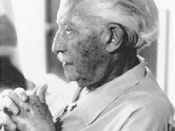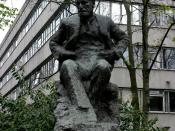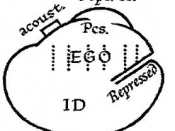In this essay, I will examine Erikson's Developmental Theory known as his 'Theory of Psychosocial Development.' The focus of this assignment will be centred on the psychological growth during Erikson's first three stages of development, spanning from birth to the age of four, or five. However, I will also briefly investigate the later periods of development in order to fully disclose the essence of Erikson's groundbreaking theory. Before my onslaught into this, the core of this essay, I will first give a brief biographical introduction to Erikson the man, and from there I will make inquiries into his relationship with Freud and the psychoanalytical movement of which he was a part. It is of my opinion that to fully comprehend and appreciate Erikson's theory, one must fathom what constitutes the man himself, for many of his beliefs and notions appear to be derived from his own personal psychological perplexities. In addition, I will also briefly describe Freud's theory of psychosexual development, as Erikson's theory is largely built on the framework of this theory, and indeed incorporates much of the content and notions introduced within it.
Erik was born in Frankfurt in 1902 and spent most of his early years in Karlsruhe (1). His father had deserted his Jewish mother before he was even born. When he was three his mother married his Jewish doctor, Theodore Homburger. Erik assumed the name Homburger at this time. Young Erik was physically more alike Northern Europeans than most of the children in his stepfather's temple. There he was referred to as Goy, while at his school he was seen as a Jew. His feeling of alienation resulted in a major sense of crisis in his adolescent life. The teenage Erik considered himself an artistic type and perhaps as a consequence of his estranged family...


